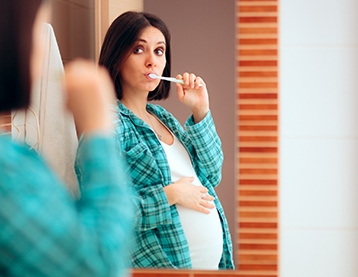Second Trimester Symptoms and Body Changes

What to expect during the second trimester
Now that you have got through the tricky first trimester of pregnancy, you may find that early pregnancy symptoms such as morning sickness start to fade. Here’s how your body and your baby will change during your second trimester.
When does the second trimester start?
Following the first 12 weeks of your first trimester, Weeks 13 to 26 of pregnancy are called the second trimester. This lasts for roughly three months. For ease, we describe the length of pregnancy as 40 weeks, starting from the first day of your last period, up to the expected date of your baby’s birth.
Once you reach the second trimester, you are a third of the way through your pregnancy and can start to enjoy it a bit more!
The changes that will happen to your body in the second trimester
Many women start to feel a lot better at the beginning of the second trimester, as the rapid changes to hormones in the first trimester start to settle down a bit. Strangely, you may even start to wonder if you’re pregnant at all, as many of the symptoms of early pregnancy have disappeared, yet your bump has not yet started to show.
Here are some of the changes going on inside you
Changes to your bump
Your baby and the womb it is snuggled inside are getting bigger and they start to move upwards in your abdomen – and will soon move outwards. This relieves the pressure on your bladder, so you shouldn’t need to pee so often!
Teeth troubles
Some women find their gums bleed more and it’s easier to get gum disease in pregnancy. Visit your dentist (it’s free), use a softer brush, and keep an eye on your dental hygiene.
Keep healthy
It’s easy to pick up infections at this point, so avoid anyone with Chicken Pox, Zika or Rubella and avoid touching pet poo – your partner has cat litter duties now! Make sure you avoid certain foods that could cause food poisoning. It is advised by the NHS to get your Coronavirus vaccine, and any other vaccines offered to you, such as the flu and whooping cough inoculations.
Changes to your libido
Because you have more blood pumping around inside you, many women feel their sex drive increases at this point, especially if you couldn’t face any physical contact during the first trimester. It’s completely safe to have as much sex as you want!
Keep hydrating
Make sure you keep drinking plenty of water, as it’s easy to get dehydrated at this time, especially if you are exercising gently. It can help avoid urine infections, which you are more at risk of now.
Physical second trimester symptoms
You may still have some of the pregnancy symptoms from the first trimester such as sore breasts, constipation, and heartburn. You may develop new ones, including headaches, nosebleeds, leg cramps, swollen hands, feet and ankles and dark patches on your skin. Speak to your midwife about anything concerning.
Hair that looks great
You lose fewer hairs during pregnancy, so by now you should have a thicker, shiny mane.
Why you can start to feel better during the second trimester
You may start to feel a lot better during the second trimester of pregnancy, especially if you had a hard time with morning sickness. This is because the rapid change of hormones you experienced during the early weeks of pregnancy, that allowed your baby to be conceived, implant into the womb and start to grow rapidly, have calmed down. The pregnancy is now well established, and you can start to relax about the baby and enjoy your pregnancy. You may well have had your first ultrasound scan by now and will start to tell friends and family your happy news.
What changes are happening to the baby in the second trimester?
Your foetus is now growing and at 13 weeks is around 7.4cm long, growing to about 36.6cm by week 27. The head is the largest part of their body and their senses and organs are developing. During this trimester your baby will change as follows:
Sex: by now, you can usually tell what sex your baby is on an ultrasound scan.
Hearing: your baby will be able to hear sounds from inside the womb
Hands and feet: these continue to grow and develop fingerprints
Body: your baby’s body is covered with very fine hair and a waxy substance called vernix
Digestive system: your baby will swallow amniotic fluid and pass urine
Nerves: Your baby can feel things by now, as the nervous system develops
Things to do and things to avoid during the second trimester
You should continue to avoid contact sports
During your second trimester and anything that carries a risk of injury or falling. You can, however, do some gentle pregnancy exercise, jog, walk, swim, attend yoga classes and start hypnobirthing classes. Keep moving to avoid gaining too much weight and to help you have an active birth.
Avoid foods that might cause food poisoning
Ensure you avoid foods that might cause food poisoning and those that carry a risk to your baby such as seafood containing heavy metals.
Stay away from smoking and drinking
Stop smoking and drinking and don’t take drugs unless prescribed by your doctor.
Eat well and take a pregnancy supplement
Try and take pregnancy supplements containing folic acid and vitamin D. Don’t ‘eat for two,’ as you don’t need more calories in the first or second trimesters.
Keep an eye on your baby’s movements
As you start to feel them and learn what’s normal for your baby. If you notice a decrease in the frequency of movements, speak to your midwife or GP immediately.
Sleep on your side
Sleeping on your back can risk stillbirth, due to your womb pressing on major blood vessels, so now is the time to train yourself to sleep on your side. If you can’t get comfy, try a pregnancy positioning pillow.
Keep mentally healthy
Make sure you take some time for yourself, as you may find that you are busy with work and family, as well as having the additional pressures of pregnancy. Get outside each day, keep active as this can help with mental health and speak to your medical team if you are finding it hard to stay positive. There is help available for ante-natal depression and anxiety and it is common, so don’t be afraid to speak up.











